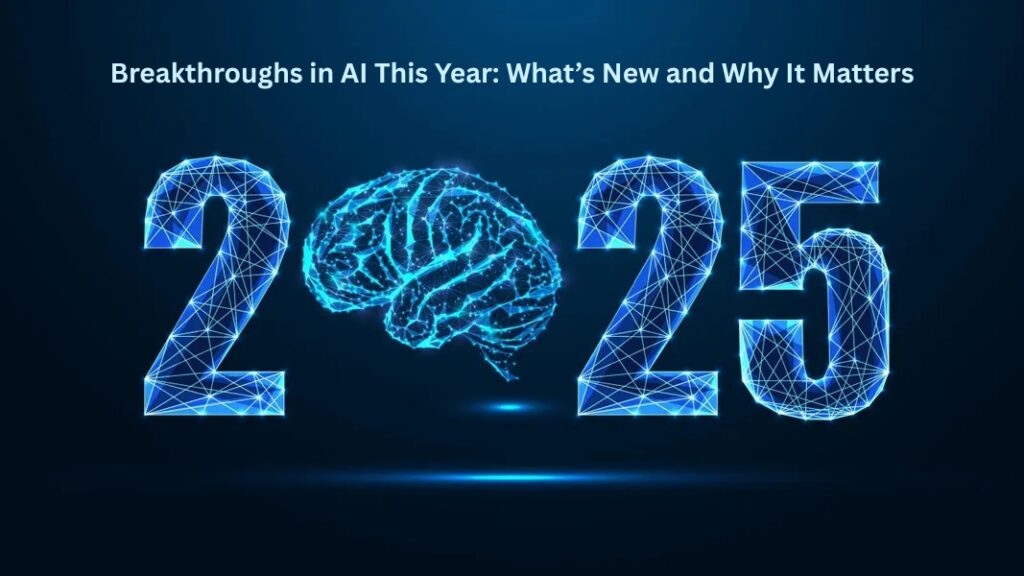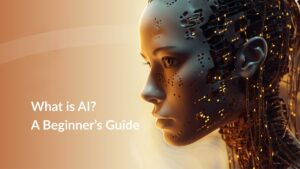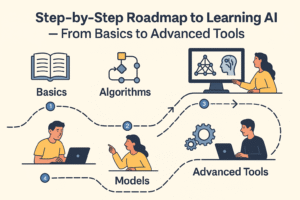
If AI in 2023 felt like a fast car, 2025 is a rocket ship — and we’re all passengers. This year, the pace hasn’t just quickened; it’s diversified. Foundation models think faster, multimodal AI sees and hears like never before, research labs cracked complex reasoning puzzles, and practical tools for climate and healthcare have stepped out of theory into action.
The takeaway? AI is no longer a “future” discussion — it’s here, reshaping how we learn, work, and make decisions. Let’s walk through the biggest breakthroughs of 2025, why they matter, and how you can actually use them.
1. GPT-5 — Bigger Brain, Better Memory
OpenAI’s GPT-5 isn’t just a number upgrade; it’s a usability leap.
- What’s new? It processes massive context windows (think entire books), handles text, images, audio, and video in the same conversation, and gives more grounded, fact-checked answers.
- Why it matters: Complex work like reviewing legal contracts, analyzing large research datasets, or generating training material can now happen in one smooth session — without slicing information into chunks.
2. Multimodal & Agentic AI — From Responding to Doing
Until now, AI mostly talked. Now, it’s taking action.
- Multimodal means it can read your PDF, watch a short clip, hear your voice memo, and understand them together.
- Agentic AI means it can plan steps, use tools, and complete multi-part tasks — booking your flights, summarizing a meeting, then drafting follow-up emails.
- Why it matters: This is where AI stops being a “smart search box” and becomes your operations assistant.
3. Research Wins — Math Meets Machine
Labs have pushed AI’s reasoning abilities with reinforcement learning upgrades and math-driven architecture tweaks. This isn’t hype — models now solve more complex, multi-step problems with higher accuracy.
- Why it matters: It brings AI closer to reliable forecasting and decision-making — whether for market analysis or policy simulations.
4. AI for Climate — Forecasting the Future
2025 saw climate AI shift from “lab experiment” to “boardroom tool.”
- It’s combining satellite data, historical weather, and economic indicators to make sharper local predictions.
- Companies are using it to optimize renewable energy output, plan logistics for extreme weather, and reduce carbon footprints.
- Why it matters: Better forecasts mean better policy, fewer resource misallocations, and more resilience in the face of climate volatility.
5. Healthcare & Life Sciences — From Hunch to Data
AI is speeding up drug discovery and spotting disease patterns earlier from scans and patient histories.
- Why it matters: Faster trials, earlier interventions, and improved patient outcomes — provided regulators keep pace with the tech.
6. Hardware & Efficiency — Making AI Affordable
It’s not just about smarter AI, but cheaper AI. Advances in specialized chips, model optimization, and edge deployment have cut costs and latency.
- Why it matters: More organizations, even in emerging economies, can now deploy advanced AI without breaking budgets.
Why These Breakthroughs Matter to You
For developers: New APIs and frameworks let you build richer, safer AI-powered apps.
businesses: AI is now a direct lever for cost savings and market speed.
students: Free/low-cost tools make experimenting with cutting-edge tech possible from your dorm room.
policymakers: The tools exist; now’s the time to guide their safe, ethical rollout.
How to Get Started in 90 Days
- Week 1–2: Identify one workflow AI could speed up or improve.
- Week 3–6: Prototype using existing APIs or open-source models.
- Week 7–10: Test with real users, measure ROI, and address bias/privacy.
- Week 11–12: Scale the wins or refine based on feedback.
Risks & Reality Check
No tech is perfect — hallucinations, bias, and misuse risks remain. In 2025, strong AI governance isn’t optional; it’s the entry ticket for credibility.
FAQs
Q1: Is GPT-5 available for public use?
A: Yes, with expanded capabilities and multimodal inputs.
Q2: Will AI take my job?
A: It’s more likely to change how you work than replace you entirely — if you adapt.
Q3: Can AI solve climate change?
A: Not by itself, but it can give humans better data and strategies.
Also Read: Your 2025 AI Learning Blueprint: From Zero to Pro


